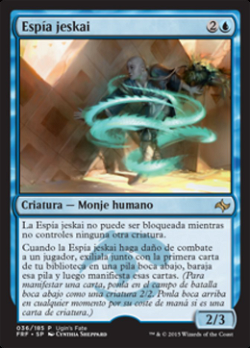Sobre Espía jeskai
Espía jeskai, Criatura — monje humano, diseñada por Cynthia Sheppard lanzado por primera vez en Jun, 2002 en edición Magic Online Promos y fue impreso exactamente en 5 diferentes formas. Actualmente se vende al precio más bajo de $ 426.12.
Esta carta de Infiltrador Jeskai sería beneficiosa en un mazo que se centra en estrategias agresivas y tiene como objetivo infligir rápidamente daño al oponente. Puede ser particularmente efectiva en un mazo que pueda controlar consistentemente el tablero para asegurar que no haya otras criaturas presentes para bloquearla. Aunque puede haber otras cartas que ofrezcan beneficios similares, la capacidad del Infiltrador Jeskai para manifestar cartas al infligir daño de combate proporciona una ventaja adicional en cartas y potencial para jugadas sorpresa, lo que lo convierte en una opción viable para mazos que buscan mantener la presión sobre el oponente.
Reglas
13/07/18
A permanent that turns face up or face down changes characteristics but is otherwise the same permanent. Spells and abilities that were targeting that permanent, as well as Auras and Equipment that were attached to the permanent, aren’t affected.
13/07/18
At any time, you can look at a face-down permanent you control. You can’t look at face-down permanents you don’t control unless an effect instructs you to do so.
13/07/18
Because face-down creatures don’t have a name, they can’t have the same name as any other creature or share any creature types with any other creature, even another face-down creature.
13/07/18
If an effect tries to return a face-down creature to the battlefield after it leaves (such as Aminatou’s second ability or Adarkar Valkyrie’s delayed triggered ability), that effect returns the card face up. If it tries to put an instant or sorcery card onto the battlefield this way, that card remains in its current zone instead.
13/07/18
The face-down characteristics of a permanent are copiable values. If another object becomes a copy of a face-down creature or if a token is created that’s a copy of a face-down creature, that new object is a 2/2 colorless face-up creature with no abilities.
13/07/18
You must ensure that your face-down spells and permanents can easily be differentiated from each other. You’re not allowed to mix up the cards that represent them on the battlefield to confuse other players. The order they entered the battlefield should remain clear. Common methods for indicating this include using markers or dice, or simply placing them in order on the battlefield. You must also track how each became face down (manifested, cast face down using a morph ability, and so on).
24/11/14
A card’s owner is public information at all times. If the two cards you exile are owned by different players (perhaps because you gained control of a Jeskai Infiltrator owned by your opponent), which card is which is no longer hidden from your opponent. That player will know which face-down creature they own.
24/11/14
At any time, you can look at a face-down permanent you control. You can’t look at face-down permanents you don’t control unless an effect allows you to or instructs you to.
24/11/14
Because the permanent is on the battlefield both before and after it’s turned face up, turning a permanent face up doesn’t cause any enters-the-battlefield abilities to trigger.
24/11/14
If a manifested creature would have morph if it were face up, you may also turn it face up by paying its morph cost.
24/11/14
Some older Magic sets feature double-faced cards, which have a Magic card face on each side rather than a Magic card face on one side and a Magic card back on the other. The rules for double-faced cards are changing slightly to account for the possibility that they are manifested. If a double-faced card is manifested, it will be put onto the battlefield face down. While face down, it can’t transform. If the front face of the card is a creature card, you can turn it face up by paying its mana cost. If you do, its front face will be up. A double-faced permanent on the battlefield still can’t be turned face down.
24/11/14
The face-down permanent is a 2/2 creature with no name, mana cost, creature types, or abilities. It’s colorless and has a converted mana cost of 0. Other effects that apply to the permanent can still grant or change any of these characteristics.
24/11/14
The pile is shuffled to disguise from your opponents which manifested creature is which. After you manifest the cards, you can look at them.
24/11/14
You must ensure that your face-down spells and permanents can easily be differentiated from each other. You’re not allowed to mix up the cards that represent them on the battlefield in order to confuse other players. The order they entered the battlefield should remain clear. Common methods for indicating this include using markers or dice, or simply placing them in order on the battlefield. You must also track how each became face down (manifested, cast face down using the morph ability, and so on).










— Comentarios0
Se el primero en comentar